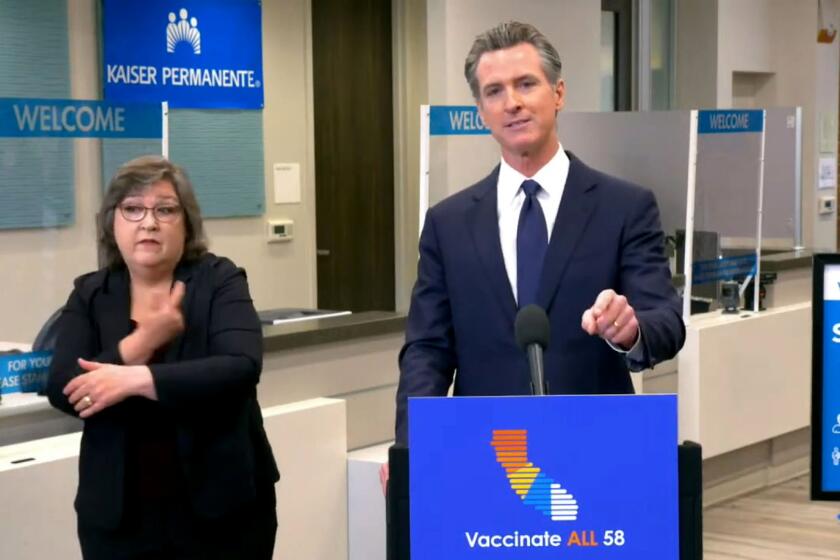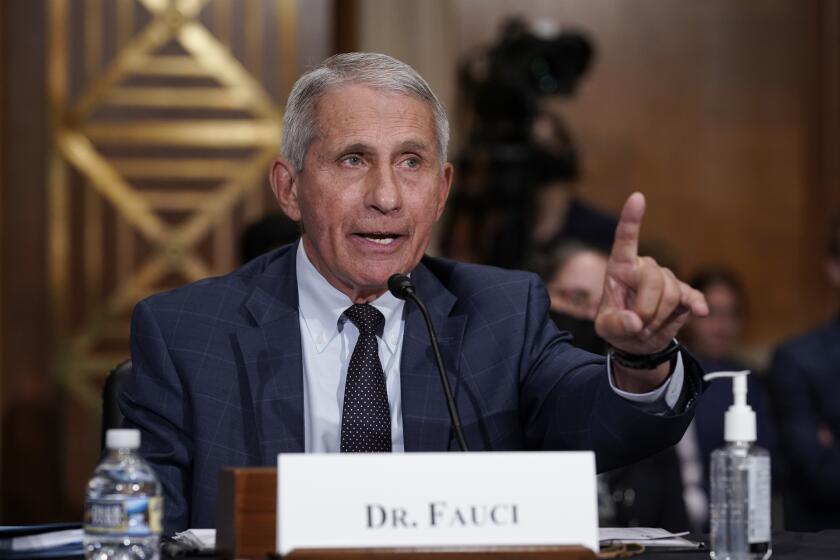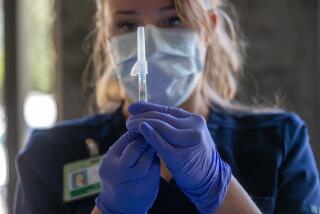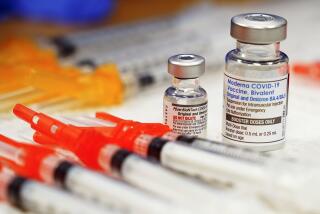VA becomes first major federal agency to require COVID-19 shots for healthcare workers
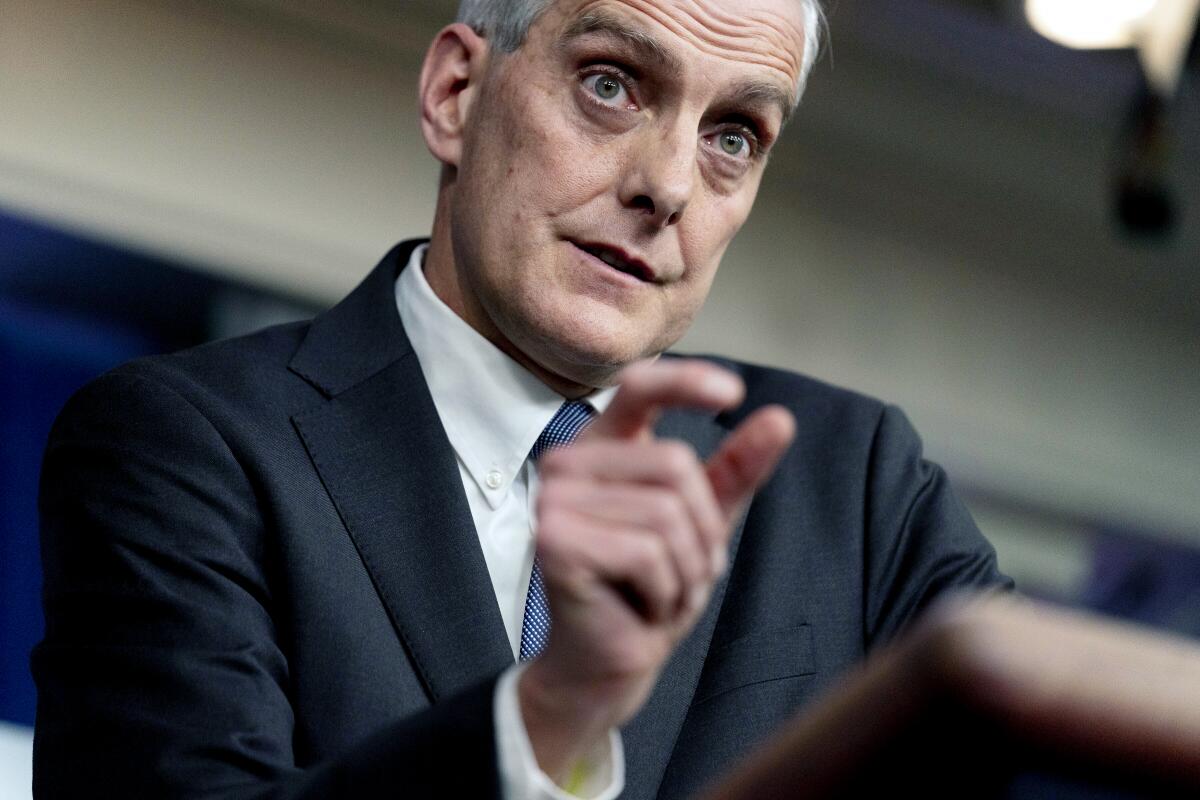
- Share via
WASHINGTON — The Department of Veterans Affairs on Monday became the first major federal agency to require healthcare workers to get COVID-19 vaccines, as the aggressive Delta variant spreads across the nation and some communities report troubling increases in hospitalizations among unvaccinated people.
The VA’s move came on a day when nearly 60 leading medical and healthcare organizations issued a call for healthcare facilities to require their workers to get vaccinated. No federal law stands in the way of employers requiring vaccinations, but like mask mandates, the issue has been politicized in a society that’s divided on matters of public health.
“With more than 300 million doses administered in the United States and nearly 4 billion doses administered worldwide, we know the vaccines are safe and highly effective at preventing severe illness and death from COVID-19,” Dr. Susan Bailey, immediate past president of the American Medical Assn., said in a statement. “Increased vaccinations among healthcare personnel will not only reduce the spread of COVID-19 but also reduce the harmful toll this virus is taking within the healthcare workforce and those we are striving to serve.”
Although vaccination among physicians is nearly universal — 96%, according to an AMA survey — that’s not the case for many other people working at healthcare facilities. In nursing homes, only about 60% of staffers are vaccinated, compared with about 80% of residents, according to recent numbers from Medicare. And COVID-19 cases are rising.
At the VA, vaccines will be now mandatory for certain medical personnel — including physicians, dentists, podiatrists, optometrists, registered nurses, physician assistants and others who work in departmental facilities or provide direct care to veterans, said Secretary of Veterans Affairs Denis McDonough.
Employees will have eight weeks to be fully vaccinated.
“It’s the best way to keep veterans safe, especially as the Delta variant spreads across the country,” McDonough said in a statement. “Whenever a veteran or VA employee sets foot in a VA facility, they deserve to know that we have done everything in our power to protect them from COVID-19.
“With this mandate, we can once again make — and keep — that fundamental promise,” he added.
California government and healthcare employees will soon be required to show proof they’ve been vaccinated against COVID-19 or be tested regularly.
It was unclear what would happen to VA employees who refuse to be vaccinated. The agency said vaccination will be required “absent a medical or religious exemption.” The long-standing policy in the healthcare industry is for staff to stay up-to-date with vaccinations, such as annual flu shots. Exceptions for medical reasons include known allergies.
In addition to the AMA, the medical and healthcare groups calling for mandatory vaccines for health workers included the American Academy of Nursing, the American Public Health Assn., the American Pharmacists Assn. and, for the first time, a nursing home industry group.
LeadingAge, which represents nonprofit nursing homes and elder care facilities, had previously advocated educating nursing home employees about the benefits of getting their shots.
Also joining the call was the National Medical Assn., the leading professional group representing Black physicians.
“Unfortunately, many healthcare and long-term care personnel remain unvaccinated,” the groups said in a statement. “We stand with the growing number of experts and institutions that support the requirement for universal vaccination of health workers.”
The Delta variant of the coronavirus has taken on a decidedly American feel, mainly targeting those who just won’t get vaccinated.
Earlier this year, the U.S. Equal Employment Opportunity Commission said current federal laws do not prevent an employer from requiring employees physically entering the workplace to be vaccinated against COVID-19.
The Centers for Disease Control and Prevention has heavily promoted vaccinations as a way to slow the pandemic and save lives. However, the agency has not recommended that state or local officials, or employers, mandate vaccinations for their employees.
“The politics is really tricky because President Biden hasn’t ordered mandatory vaccinations for federal workers,” said Lawrence Gostin, a public health law expert at Georgetown University. “And it would seem hypocritical if CDC made that recommendation” to businesses or state and local officials, he said.
A CDC spokeswoman would not comment.
To make matters more complicated, the COVID-19 vaccines have yet to win full approval from the Food and Drug Administration. They continue to be provided under emergency use authorization and the lack of a full approval has fed into hesitancy among some people.
Dr. Anthony Fauci says the U.S. is in an ‘unnecessary predicament’ of soaring coronavirus cases fueled by unvaccinated Americans and the Delta variant.
Still, the FDA’s emergency approval process was thorough and didn’t skip the extensive testing required of any vaccine. Of the three manufacturers of vaccines approved in the U.S., Pfizer and Moderna have applied for full approval, and a Pfizer decision is expected soon.
The COVID-19 vaccines were not brewed overnight, either. They were the fruit of more than 10 years of behind-the-scenes research and huge injections of funding that laid the groundwork for them to be rolled out so quickly.
Katie Smith Sloan, CEO of LeadingAge, said it’s time to go beyond the power of persuasion.
“As COVID-19 variants emerge and proliferate, we can start saving more lives today by ensuring staff are fully vaccinated,” she said.
More to Read
Sign up for Essential California
The most important California stories and recommendations in your inbox every morning.
You may occasionally receive promotional content from the Los Angeles Times.
